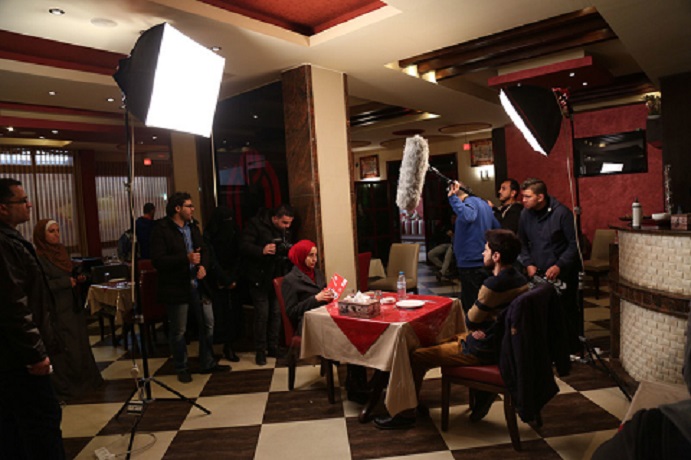Sarah Algherbawi
The Electronic Intifada / August 14, 2020
Like everything else here in Gaza, the local television industry is hampered by the Israeli siege and a lack of opportunities for economic and professional development.
The handful of serials recently produced in Gaza have sought to dramatize this difficult reality. These shows present a Palestinian narrative while more lavishly funded programming aired by Gulf broadcasters like MBC increasingly serve their countries’ warming relations with Israel.
Alaa Alaloul’s series Ten Years, filmed in Gaza, revolves around a lawyer named Hayat who tries to prove the innocence of her brother who is imprisoned by Israel on charges of involvement in the killing of soldiers.
The storyline spans over a decade, as the title suggests, and Hayat’s pursuit of justice is cut short when she and one of her children are killed by Israeli soldiers. Her surviving son picks up where his mother left off and discovers an explosive truth.
Alaloul went on a quest of his own to find a broadcaster to air the 12 episodes, each under 20 minutes. Local channels weren’t able to give him a good enough financial offer and regional broadcasters wanted to delete scenes and episodes for political reasons, according to the director.
“One of the Arab channels agreed to pay the required amount but stipulated the deletion of some large sections that talk about Israel. We refused,” Alaloul said. Among the scenes those broadcasters wanted to censor were ones showing Palestinians being tortured, he said.
Discouraged
Ten Years cost $70,000 and took nearly a year to produce. Despite its sophistication, both technically and in its storytelling, Alaloul couldn’t find a home for a series that he had intended to be shown during the month of Ramadan, traditionally the time when blockbuster serials air on TV.
In the end, Alaloul put the show on his YouTube channel after trying for three years to sell it without success. It has discouraged him from new projects.
“I have ideas on paper for new shows but I’m afraid to start producing them,” he said.
Hosam Abu Dan was able to find broadcasters willing to air his 15-episode series Cluster, which weaves together several narratives to create a tapestry of Gaza’s woes.
One of those threads focuses on a character named Amal, a woman who is about to give birth to her first child while separated from her husband, a fighter confronting invading troops, during Israel’s bombardment of Gaza in summer 2014.
The plotline is based on the real-life siege and shelling of Khuzaa, in southernmost Gaza, during an Israeli ground invasion in that 51-day war.
Despite the death and destruction all around her, Amal’s baby is born healthy. Her husband risks his life by sneaking into the clinic where Amal is sheltering to check on his wife and child.
Diana al-Ayoubi, who plays Amal and is a mother of two in real life, said she talked to women who were pregnant during war to learn from their experiences.
But since several of the scenes were filmed at night, it was difficult for her to win her family’s approval to take on the role.
Alaa al-Gabary also had to defy conservative expectations of women to portray a nurse working alongside the doctor running the clinic where Amal and other injured and terrified civilians had sought refuge. The role was her first, “but it will not be my last,” the 24-year-old told The Electronic Intifada.
“I feel that my personality changed after this experience; I have the courage to face any situation and fight for what I want,” she said.
Tragedy
But up-and-coming actors in Gaza have limited opportunities to develop their talents. The lack of experienced actors is a major obstacle, according to Abu Dan, the director. And few women actors are willing to perform in TV dramas because of the social attitudes encountered by Al-Ayoubi and Al-Gabary.
There are also few locations suitable for or dedicated to filming. Most of Abu Dan’s series was made in public streets and private homes, which took a lot of effort to set up for production.
The high production quality prompted Al-Arabiya to claim in a broadcast that the series was backed by Hamas with Iranian assistance. The Saudi outlet subsequently removed the video in which it made the allegation after being challenged by Abu Dan and New Scene, the company that produced the series. They say the show was made independently without the interference or support of any authorities.
Quality production can’t rescue a superficial script, however. Some viewers in Gaza, this one included, found that Cluster’s overly simple dialogue fails to reflect the depth of tragedy experienced by Palestinians in Gaza during the war and as a result of Israel’s blockade.
Yet, the issues raised are all too familiar to the actors in the show.
Cluster’s main star, Ghassan Salem, 29, plays the role of Tamer, an educated young man in Khuzaa searching for an opportunity to emigrate.
Salem’s lack of hope for a thriving future in Gaza isn’t far removed from that of his character.
“The major challenge about being an actor in Gaza is that I can’t consider this as my job. It’s only a hobby. I can’t make my living out of acting only.”
And so he is looking to go abroad to pursue an acting career, finding precious little paid work in Gaza.
Sarah Algherbawi is a freelance writer and translator from Gaza













